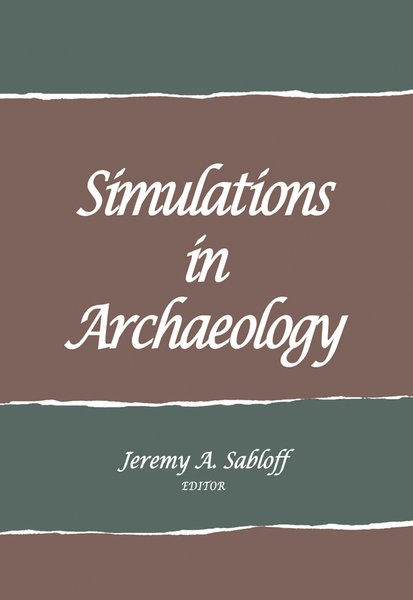Simulations in Archaeology
Edited by Jeremy A. Sabloff This book aims to clarify the reasons for using systems models and computer simulations in seeking to understand dynamic cultural patterns. Computer simulations grow logically out of the steps taken by archaeology in the past century: from random data collection to cultural description, proceeding through chronological ordering to interest in process, and finally to systems construction. The chapters cover simulations within the framework of four case studies, from site abandonment in Wetherill Mesa, Colorado, to urban growth and decay in ancient Rome; from hunting and gathering to agriculture, and from feudalism to capitalism. The contributors use critical mathematical tools to describe cultural processes, construct and evaluate simulation models, and explore the potential of archaeology’s unique data in the study of long-term cultural change. 1981. 356 pp., 42 figures, 1 map, 15 tables, notes, references, index, 6 x 9 Contributors: Mark S. Aldenderfer, James A. Bell, Kenneth L. Cooke, Linda S. Cordell, Richard H. Day, Gilbert W. Low, Colin Renfrew, Jeremy A. Sabloff, Ezra B. W. Zubrow This volume is available through print on demand, shipped directly to you. Please fill out the following form to receive information about pricing.
Simulations in Archaeology inquiry:
No reviews at this time.
- Background Jeremy A. Sabloff
- Computer Simulation for Archaeology: An Introductory Essay Mark S. Aldenderfer
- Scientific Method and the Formulation of Testable Computer Simulation Models James A. Bell
- Creating Assemblages by Computer Simulation: The Development and Uses of ABSIM Mark S. Aldenderfer
- The Wetherill Mesa Simulation: A Retrospective Linda S. Cordell
- Simulation as a Heuristic Device in Archaeology Ezra B. W. Zubrow
- Dynamic Systems and Epochal Change Richard H. Day
- On the Construction and Evaluation of Mathematical Models Kenneth L. Cooke
- Using System Dynamics to Simulate the Past Gilbert W. Low
- The Simulator as Demiurge Colin Renfrew
There are no working papers for this book at the present time.
